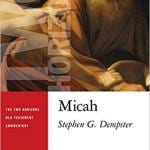Timothy Beale
The Book of Revelation: A Biography.
Lives of Great Religious Books.
Princeton: Princeton University Press, 2018.
Available at Amazon.com
This book by Timothy Beale is a fun and readable exercise in reception-history. It is a fun ride into how Revelation has inspired also sorts of apocalyptic fantasies and expectations. Beale starts out discussion hexakosioihexekontahexaphobia, which fear of the number 666. He also notes debates over the canonicity of Revelation in the early church and how many feminists think the language of patriarchy and violence renders it irredeemable. Beale regards Revelation much like Frankenstein’s monster: “John’s text of Revelation is not only like Shelley’s novel; it is also like the novel’s monster, just as John is also like the monster’s creator, Dr. Frankenstein. For, as we will see, the text of Revelation is not so much born from the mind of its creator as it is stitched together from pieces of other texts and then animated, given a life of its own” (9). He rightly notes the dense intertextual nature of the Book of Revelation: “the literary text of Revelation is an intertextual amalgamation of hundreds and hundreds of bits, pieces, and larger chunks from Jewish scriptures and other ancient Near Eastern and Greco-Roman mythologies, all stitched together, brought to life and adopted by an otherwise unknown, unhomed visionary” (48). Thereafter Beale provides highlights of the reception of Revelation by Augustine, Hildegard’s Apocalypse (who knew Revelation not as a book, but through Benedictine liturgy), Joachim of Fiore (who wrote three major works on Revelation), and Cranach’s drawings of Revelation for Luther’s German Bible (which made the book popular again). There is a truly amazing chapter about the artwork of James Hampton’s American piece called The Throne of the Third Heaven of the Nations’ Millennium General Assembly where a man tried to actually make the thrones that will be used in Revelation 7:9-11 for the assembly of nations before the Lamb. The final chapter deals with Evangelical rapture horror culture from such epic hits as “A Thief in the Night” and “Left Behind.” In the post-script, Beale notes how both Hillary Clinton and Donald Trump have been identified as the beast whose number is 666. He mentions a Liberal prepper group preparing for the end of the world under Trump (don’t laugh, we’re still suffering the effects of COVID-19).
I get the feeling that Beale’s verdict on Revelation is mostly negative: its a monster and a monster-making book, an “othering machine,” a pastiche of evils to impute to my enemy to make him/her/it the incarnation of ultimate evil, ammunition against immigrants and foreigners, and used to justify violence, etc. Revelation is a sponsor of secular and religious views of human dominion. I think that is onesided. In my mind, Revelation imagines divine violence in order to renounce human violence: leave judgment to God! We hold to the testimony and endurance of Jesus Christ, the church is there for witness, not war!
I was also disappointed that the book was somewhat Americancentric. I’d like to hear about how the Book of Revelation is interpreted in African contexts, by Chinese Christians living under Communism, or even Latino Liberation interpretation of Revelation. Otherwise, this is a very readable, enjoyable, and enlightening book, well worth including in any courses on the Book of Revelation.












